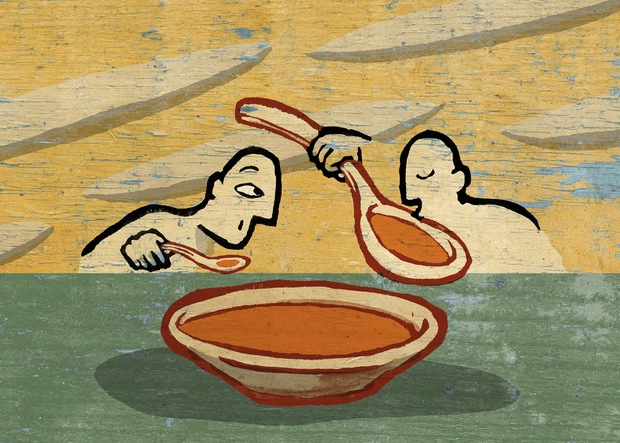(This blog was first published at www.sayhelloadvertising.com/blog. It's an amazing business providing work opportunities and professional growth to folks in the Fresno, CA inner city...check it out!)
Work and the Economy
Unfortunately, not everyone gets to benefit the same.
Access to opportunity builds on itself. Once I get one good job, it is much easier for me to get another good job because of my improved resume. If my father also had a string of good jobs, our family is better able to prepare me for the same kind of future. Now, if everyone in my neighborhood has had great jobs with a history of success and opportunity, collectively our community becomes highly competitive and predisposed to continue building on our success.
Now imagine that you grew up in a community where no one has ever had one of those "good jobs." Your parents worked minimum wage their whole life and struggled with bouts of unemployment when the economy turned down and "low-skill" workers were laid off. Your neighbors were in the same boat. Most of the kids you go to school with have no one in their family who went to college. You have tried and tried to get a job, but you don't have anything on your resume to get you going. Well, your chances of benefiting from this incredible economy we have would be much lower than mine.
The Ever Widening Gap
Over time, these dynamics of opportunity keep compounding on each other. Those who have a history of opportunity and success are able to keep leveraging their pasts accomplishments for ever greater rewards. And those who have less to build on fall farther and farther behind.
At this point in American history, wealth disparities are back to the record levels set during the Great Depression.
Robert Linthicum lays out the progression in his book Transforming Power:
"[Between 1979 and 1995] high school graduates experience a decline of 17 percent in the buying power of their income. And those who did not graduate form high school had a 27 percent decrease. Meanwhile the CEOs of the one hundred largest companies in the United States each went from an average annual income of 1.3 million dollars to 37.5 million dollars--one thousand times the pay of their production crews! According to a 2002 New York Times Magazine article, "The 13,000 richest families in America had almost as much income (in 1998) as the 20 million poorest households." However, the richest gave 35 percent of all campaign dollars in recent presidential elections."
There's a problem here folks.
The Bible's Thoughts on Inequality
We have to take a hard look at how God feels about people who enjoy the fruits of an economy that denies it's goods to those at the bottom of society.
We should carefully consider God’s attitude toward societies that exclude the weak from participation in and benefit from the rewards of their economic system. In the book of Amos, the prophet rebukes Israel and her neighbors for their injustices. Gaza had sold an entire people into slavery. The Ammonites had committed terrible cruelty, mutilating pregnant women to grow their empire. In the face of all these atrocities, Israel is held at the highest degree of culpability. God will not “revoke the punishment” because his people too have sold the poor for the slightest of profits and shown disregard for their suffering. In valuing wealth over the poor, they engaged in idol worship and marred the holy name of the Lord (2:7-8). The businessmen of the nation extorted the poor through the markets and political rulers taxed them into desperation (5:11). The rich grew richer while the poor grew ever more disenfranchised and powerless. God spoke to the powerful of Israel, critiquing their selfish indulgence, declaring:
“Woe to those who lie on beds of ivory and stretch themselves out on their couches, and eat lambs from the flock and calves from the midst of the stall, who sing idle songs to the sound of the harp and like David invent for themselves instruments of music, who drink wine in bowls and anoint themselves with the finest oils, but are not grieved over the ruin of Joseph! Therefore they shall now be the first of those who go into exile, and the revelry of those who stretch themselves out shall pass away.” (6:4-7)
God instructed his people to “love your neighbor as yourself” (Lev 19:18). Instead, Israel devolved into greed and self-serving injustice.
Today's economic world is eerily similar to Amos'. But the Church and all people of conscience can learn from Israel’s failures. We have an opportunity to reject self-centered economies and create new pathways of inclusion and equitable sharing. Businesses like Say Hello--started by a church--are springing up all over our city, nation, and world. They are choosing a caring economy that works for everyone.
Which economy will you choose?


No comments:
Post a Comment